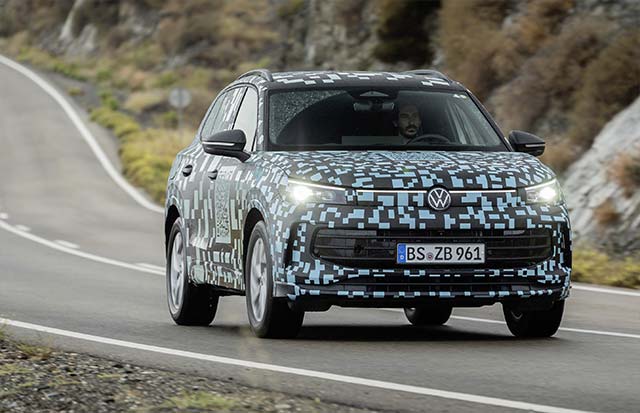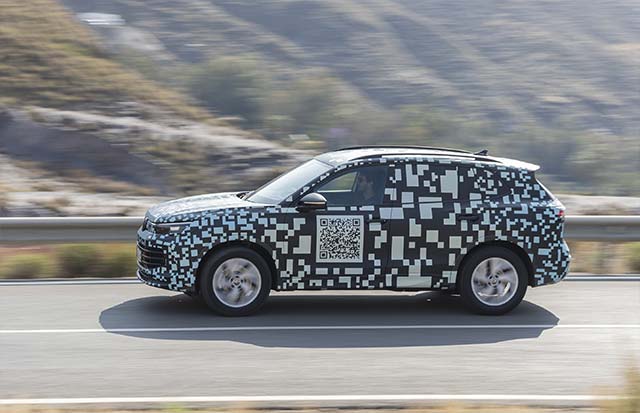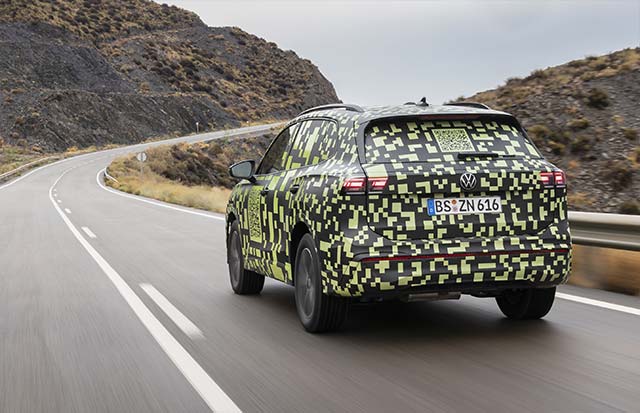Volkswagen recently shared the first insights into its highly popular Tiguan model, which is currently in its final test drives. The third generation of the Tiguan boasts several notable features, including a newly developed active suspension control system and HD Matrix headlights. The vehicle is built on the new MQB evo platform, which is part of Volkswagen’s modular transverse matrix generation. Additionally, the new Tiguan will offer a plug-in hybrid drive, enabling it to achieve electric ranges of up to 100 kilometers (62 miles) in the future. The global premiere is scheduled for autumn, with the market launch planned for 2024.
For years, the Tiguan has held the distinction of being Volkswagen’s best-selling model worldwide. Since its initial release in autumn 2007, over 7.4 million individuals have chosen this SUV around the globe. Volkswagen is now preparing to relaunch the successful model with significant improvements.

To enhance the new Tiguan, Volkswagen has further refined its modular transverse matrix, resulting in the introduction of the MQB evo generation. According to Kai Grünitz, Member of the Brand Board of Management responsible for Technical Development, the MQB evo platform seamlessly integrates cutting-edge technology components. This includes a new generation of plug-in hybrid drives capable of achieving electric ranges of up to 100 kilometers, an advanced active chassis control system, premium interior quality, and an intuitive infotainment system that meets the expectations of Volkswagen drivers.
One of the standout features of the Tiguan will be the optional HD matrix headlights. Developed jointly for the Tiguan and Touareg, the IQ.LIGHT HD matrix headlight technology brings premium-class lighting to the mid-sized Tiguan.
The interior of the Tiguan has undergone a comprehensive redesign to cater to specific customer requirements and ensure intuitive operation. The revamped model will include a newly developed cockpit and an upgraded infotainment system. The spacious screen, measuring up to 38 centimeters (15 inches) diagonally, prominently displays essential functions such as navigation, music, and climate control. The center console incorporates the Driving Experience Control, featuring a rotary control with its own mini-screen for adjusting the drive mode, radio volume, or ambient lighting colors. The Tiguan’s interior also boasts high-quality materials, newly designed seats, and enhanced noise insulation, delivering increased comfort and a premium-class noise experience. Additionally, the center console provides ample storage space.

Moving forward, the Tiguan will exclusively offer an automated shift gearbox (DSG). Similar to the Volkswagen ID. models, the gear position can be changed via a steering column switch located on the right side of the steering wheel, featuring a self-explanatory operating principle. By turning the switch forwards to “D,” the vehicle moves forward, while reversing is achieved by turning it backward to “R.” The switch also serves as the parking brake. Paddle shifters located behind the steering wheel will also be available.
The MQB evo platform serves as the foundation for the new generation of the adaptive suspension control DCC. The Tiguan will offer the optional DCC Pro system, equipped with two-valve shock absorbers. Additionally, the model comes standard with a vehicle dynamics manager, an MQB system previously introduced in the current Golf GTI2. This system governs the functions of electronic differential locks (XDS) and the lateral dynamics components of the controlled shock absorbers in the DCC Pro system. With the Vehicle Dynamics Manager’s assistance, the Tiguan delivers improved handling characteristics, offering neutral, stable, agile, and precise performance. Passengers will experience increased comfort and significantly enhanced performance during dynamic cornering.

Thanks to the MQB evo platform, the Tiguan can accommodate various drive types. It will be available with turbodiesel engines (TDI), turbocharged petrol engines (TSI), mild hybrid turbocharged petrol engines (eTSI), and plug-in hybrid systems (eHybrid). The new plug-in hybrid drives boast an increased electric range of up to 100 kilometers (62 miles), depending on the specific model. Moreover, all eHybrid versions will feature faster AC charging, with standard DC charging available for the first time.
Customers interested in the Tiguan will have the option to choose ergoActive front seats, which offer pneumatic four-way lumbar support adjustment and a pneumatic 10-chamber pressure point massage function in the backrests. These premium-class features are complemented by seat heating and ventilation.
In terms of dimensions, the new Tiguan has grown approximately three centimeters in length, while maintaining almost identical height, width, and wheelbase measurements compared to its predecessor. The increased use of space is evident in the luggage compartment capacity, which has expanded by 33 liters to reach 648 liters (when loaded up to the height of the rear seat backrests).
